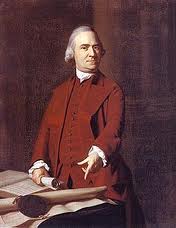What sort of devout Christian was Sam Adams? Like many New Englanders of his age he was in fact a devout Calvinist (and less well known was his strong emphasis on the second coming of Christ and eschatology in general). Here is a very interesting letter from John Adams defending Sam Adams, who was his second cousin. The letter was written to one William Tudor (whom I do not know) on 5 June, 1817. What is interesting about the letter is that Samuel had been dead for fourteen years, and yet his Christianity was still a subject of controversy at the time of this exchange.
———
You say, Mr. S. Adams “had too much sternness and pious bigotry.” A man in his situation and circumstances must possess a large fund of sternness of stuff, or he will soon be annihilated. His piety ought not to be objected to him, or any other man. His bigotry, if he had any, was a fault; but he certainly had not more than Governor Hutchinson and Secretary Oliver, who, I know from personal conversation, were as stanch Trinitarians and Calvinists as he was, and treated all Arians and Arminians with more contempt and scorn than he ever did. Mr. Adams lived and conversed freely with all sectarians, in philosophy and divinity. He never imposed his creed on any one, or endeavored to make proselytes to his religious opinions. He was as far from sentencing any man to perdition, who differed from him, as Mr. Holley, Dr. Kirkland, or Dr. Freeman. If he was a Calvinist, a Calvinist he had been educated, and so had been all his ancestors for two hundred years. He had been, from his childhood, too much devoted to politics to be a profound student in metaphysics and theology, or to make extensive researches or deep investigations into such subjects. Nor had any other man attempted it, in this nation, in that age, if any one has attempted it since. Mr. Adams was an original — sui generis, sui juris. The variety of human characters is infinite. Nature seems to delight in showing the inexhaustibility of her resources. There never were two men alike, from the first man to the last, any more than two pebbles or two peas.












